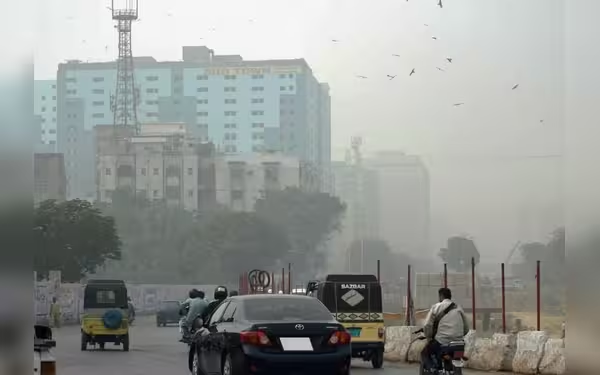Sunday, November 24, 2024 04:24 AM
Lahore Second, Karachi Fourth in Global Pollution Rankings
- Lahore ranked second, Karachi fourth in pollution.
- Vehicular emissions account for 60-70% of Karachi's pollution.
- Motorcycles contribute 69% of fuel-related pollution in Karachi.
 Image Credits: tribune.com.pk
Image Credits: tribune.com.pkLahore and Karachi rank among the world's most polluted cities, highlighting urgent air quality issues and health risks for residents.
In a concerning revelation, Lahore has been ranked as the second most polluted city in the world, while Karachi follows closely behind at the fourth position. This alarming data highlights the severe air quality issues faced by these major cities in Pakistan, raising questions about the health and safety of their residents.
According to experts, a significant portion of Karachi's air pollution, estimated at 60-70%, is attributed to vehicular emissions. This information was shared by Yasir Hussain, the head of the Climate Action Centre. The impact of vehicles on air quality cannot be overstated, as they release harmful pollutants that contribute to respiratory problems and other health issues.
Moreover, Hussain pointed out that motorcycles play a major role in this pollution crisis. Over the past five years, motorcycles in Karachi have consumed a staggering $15 billion worth of petrol. This consumption accounts for a whopping 69% of the pollution caused by fuel usage in the city. It is evident that the reliance on motorcycles, which are often seen as a more affordable mode of transport, is contributing significantly to the deteriorating air quality.
The situation in Lahore and Karachi serves as a wake-up call for both the government and the citizens. It is crucial to address the root causes of pollution, particularly the emissions from vehicles. Implementing stricter regulations on vehicle emissions, promoting public transportation, and encouraging the use of electric vehicles could be effective steps towards improving air quality.
As residents of these cities, it is essential to be aware of the air we breathe and the impact it has on our health. Simple actions, such as carpooling, using public transport, or even walking short distances, can contribute to reducing pollution levels. Together, we can work towards a cleaner and healthier environment for ourselves and future generations.













